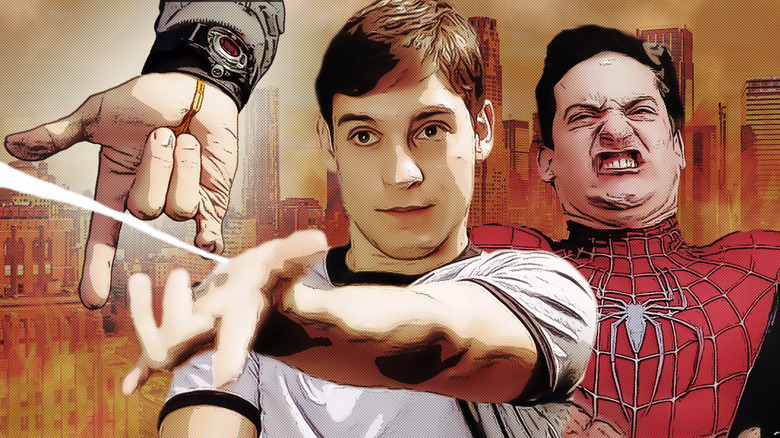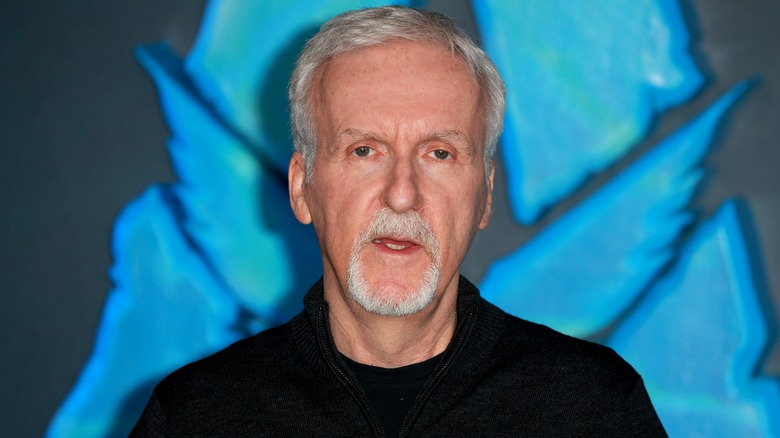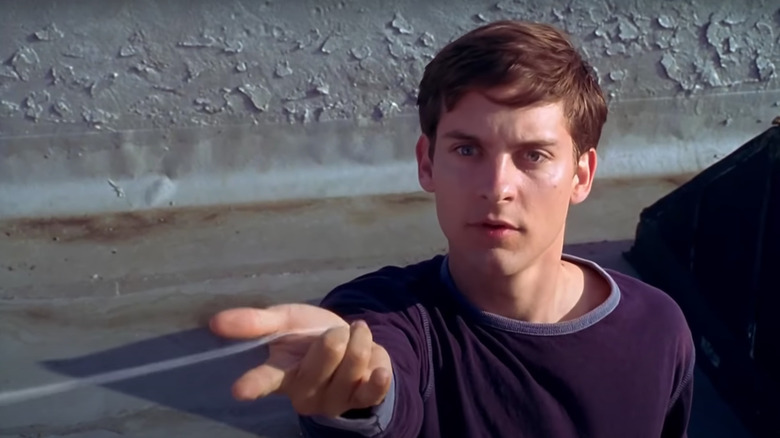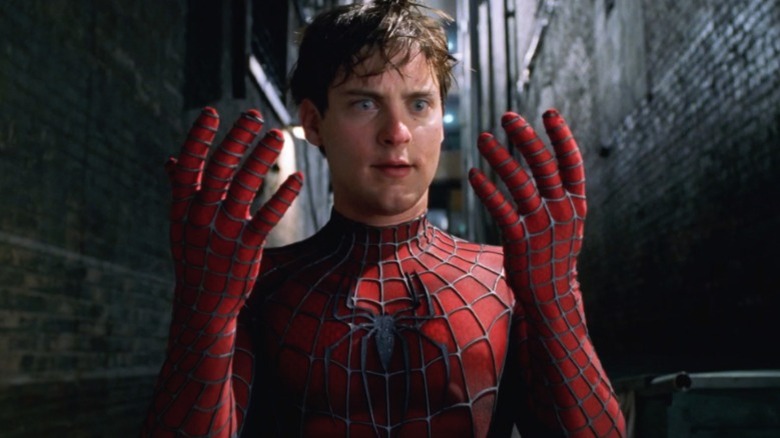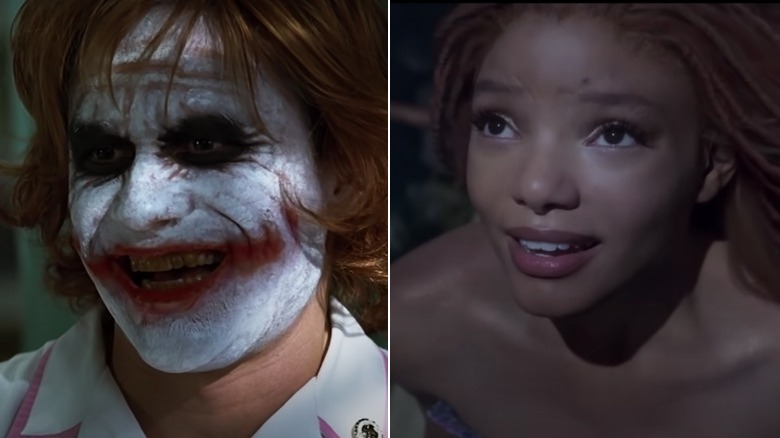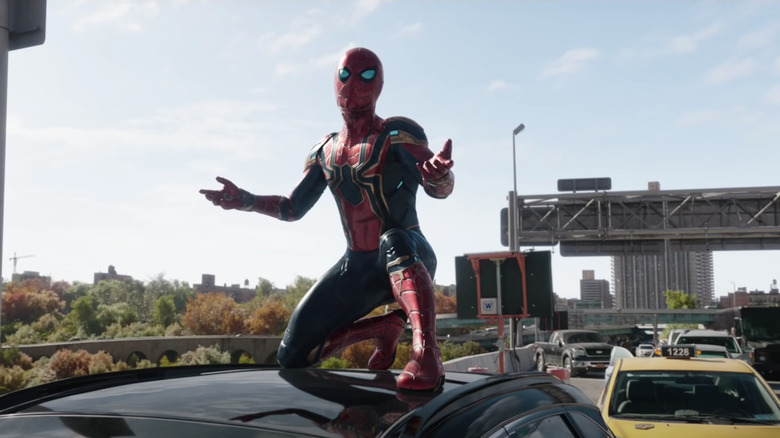How A Debate Over Spider-Man's Web-Shooters Forever Reshaped Internet Fandom In The Worst Ways
In our current age of digital hyperconnectivity, everyone has grown accustomed to internet outrage. These days, you can't throw a virtual rock without hitting a tweeted hot take, or a ravenous Reddit thread, about something silly that users desperately need off their chests. In mainstream media, as nostalgic IP is rebooted and retooled every few years, fans often feel ownership and entitlement over these properties, leading to some of the worst chatter on the interwebs.
Back in the early 2000s, though, when the superhero movie boom was in its infancy, one particular nitty-gritty topic became a sticky mess across comics-themed message boards.
Looking back, Sam Raimi's "Spider-Man" was, in fact, extraordinarily faithful to the source material: Raimi's film featured Tobey Maguire as Peter Parker, a naive teenager who receives unique gifts from a genetically-modified spider bite, only to learn a harsh lesson on adulthood when his uncle is killed due to Peter's super-powered arrogance. However, before the movie released, one key alteration from the comics went public: while Stan Lee and Steve Ditko's Peter engineered his own mechanical web-shooters, Raimi's version produced webs directly from his wrists.
Was this a small change? Definitely. Was it a good one? That's up for debate. The point, though, is that this minor deviation produced a great and ugly internet war, wherein the so-called "real" fans — consumed with rage over the thought of Spider-Man's character being tampered with — unfairly lashed out on more adaptable fans, who found the change meaningless to the overall story. This ignited a fiery discussion that exposed the worst elements of internet fandom, like gatekeeping and inexcusable vitriol, over something as trivial as Spider-Man's web shooters — forming the battle lines for vicious arguments that forever changed the way we talk about pop culture online.
James Cameron was the true inventor of Spider-Man's organic web-shooters
Truthfully, it's unfair that Sam Raimi got blamed for organic web-shooters. They originated from James Cameron's failed Spider-Man movie in the 1990s.
Cameron, who sank the unsinkable Titanic and guided bewildered audiences through Pandora, also changed the very biology of Peter Parker in his un-filmed script for the film. The reason this change carried over to Raimi's film is probably because his reasoning was actually quite sound — realism. As Cameron told ScreenCrush in 2021, his goal was to make a Spider-Man film with the verisimilitude of "Terminator." With that in mind, a teenager inventing web-shooters in his bedroom was presumably a step too far. As Cameron put it, "Going with the biological web shooters as being part of his biological adaptation to the radioactive spider bite made sense to me."
Per Cameron, he even ran this by Stan Lee, who approved. Cameron then applied this same logic to every part of his Spider-Man treatment, explaining, "I wanted it to be: It's New York. It's now. A guy gets bitten by a spider. He turns into this kid with these powers and he has this fantasy of being Spider-Man, and he makes this suit and it's terrible, and then he has to improve the suit, and his big problem is the damn suit. Things like that. I wanted to ground it in reality and ground it in universal human experience."
Cameron also used webbing as part of an extended puberty metaphor. Infamously, his script included a sequence where Peter discovers his powers through a semi-gross "wet dream" scene, involving him waking up covered in webbing he involuntary created overnight. Though this scene was scrapped, the organics change stuck, and led certain fans into a dizzying tailspin of entitled tantrums.
When Raimi went organic, fans went ballistic
When Sam Raimi and screenwriter David Koepp came along, organic webbing just made sense to them. As Raimi told Fangoria (per David Hughes' "Comic Book Movies: Virgin Film"), "He sticks to walls. He can leap; why does he then have to invent a web fluid? Why not just mutate him far enough into a spider to produce webbing?"
Most moviegoers, clearly, rolled with it. Others spoke out, most notably Joe O'Malley, who created the now-defunct No-Organic-Webshooters.com. As O'Malley told Acid Logic, "It just sounds, from what Raimi's said, that the organics (the flesh web shooters) will have Peter acting differently than he would in the comics. Like he's kind of ashamed of his powers and becomes more withdrawn, which isn't the case."
Such concerns, as we now know, didn't impact the film, where organic web-shooters were just played for laughs. In retrospect, O'Malley was, arguably, overreacting, but he kept it respectful. Other sections of the internet did not. Many furious anti-organics people started bullying any fellow fans who wouldn't boycott the movie over the change, dubbing them "fake fans" or even "Man-Spider fans."
This debate exploded across the internet. Major fights occurred on the Spider-Man Hype (now Superhero Hype) forums, as recollected via tribute threads, where the anonymity of the internet gave rise to petty squabbling, insults, and elitism on the part of anti-organics users, who felt entitled to belittle newcomers rather than welcome their fellow Spidey lovers. This childish behavior, most exemplified by the disreputable user Mr Parker, gained steam beyond Spider-Man fandom. Since then, gatekeeping has become an unshakable part of pop culture entertainment. The rage of users like Mr Parker came from an invalidated feeling of infringement, and it led to insurmountable, pointless, and often incoherent rants.
Spider-Man's organic web shooters mattered...until they didn't
While there's nothing wrong with enthusiastic fans fervently discussing pop culture, there's something to be said about the intense feeling of ownership they often feel over nostalgic properties. As is the case with most scenarios involving toxic fandom, all the turbulent discourse essentially boiled down to nothing but noise. Organic haters and casual fans turned out in droves for Raimi's "Spider-Man," grossing $825,025,036 worldwide (per Box Office Mojo). The thrilling sequel, "Spider-Man 2," is still ranked by many as one of the top superhero movies of all-time. Interestingly enough, for a brief moment in time, organic webbing even appeared in the comics, as CBR reports, proving Raimi's shift really didn't harm Peter's character at all.
That said, the tide shifted with Marc Webb's reinvention of the property in 2012's "The Amazing Spider-Man." This was a conscious decision by Webb. As the director told The Los Angeles Times (via MTV), "I had a meeting with Stan Lee and we talked about the web-shooters. The web-shooters were able to dramatize Peter's intellect and I thought that was really cool... To me, it's something I remember from when I was a kid and thinking 'It would be cool if I could build those."
By this time, the dust had settled on the once-grand web-shooters debate. By the time the Marvel Cinematic Universe rebooted Spider-Man once again with Tom Holland — and with a second round of mechanical web-shooters — the arguments had been relegated to a non-issue that nobody remembered — if only because new toxic debates had taken its place, and not just in the Spider-Man world.
Spider-Man's web-shooters set the stage for numerous ugly debates that followed
The absolute worst aspect of the pointless debate was the combination of unfettered internet access with hatred and ignorance. It's unsurprising how comfortable some are spitting hateful rhetoric anonymously, but it's nonetheless disappointing. One would hope that fandom groups — based on properties we escape to for comfort and enjoyment — would be a safe and sacred space of inclusivity. Instead, the "organics suck" debate, which was ostensibly about a miniscule alteration from the comics, opened the floodgates for anonymous users to use the internet as a platform to spew racist, homophobic, and misogynistic views, under the guise of being "real" fans.
One of the prime examples of this trend, in the post-webbing era, was the casting of Heath Ledger as the Joker in "The Dark Knight." This comic book controversy (we're noticing a pattern here) saw Ledger receive an absurd amount of hate before stepping into his purple suit, primarily because his Oscar nominated performance in "Brokeback Mountain" led to outraged Batman "fans" blasting the internet with abhorrent homophobia, as reported by Gawker. Just as with the organic webbing debate, none of this mattered in the end: when "The Dark Knight" was released, he became the most acclaimed Joker of all time, and even received a posthumous Oscar.
More recently, when the talented Halle Bailey was cast as Ariel in Disney's live-action adaptation of "The Little Mermaid," it led to another bigoted outrage. Bailey was viciously attacked online with derogatory slurs. Again, the entitled commenters felt their childhood was "under attack" by inclusion, stellar casting, and minor changes from the source material. Inevitably, like the above properties, "The Little Mermaid" will be a huge success, proving the mindless chatter is nothing more than digital pollution.
Nowadays, the webbing debate is just a joke in Spider-Man: No Way Home
Almost 20 years after the very first "Spider-Man" film was released, all three actors to play the wall-crawled reunited in the multiverse-bending blockbuster "Spider-Man: No Way Home." With nearly two decades of distance between the original "Spider-Man" and this franchise-merging sequel, director Jon Watts and the screenwriters took the opportunity to poke fun at the organic web-shooters debate in the film: in one memorable exchange, the three Peters discuss this touchy subject with hilarious results, as the Holland and Garfield versions express surprise at Maguire's unique organic versions.
While this silly moment nails down the frivolousness of the debate, it also reminds viewers that there was once a time when this was the most controversial topic in Marvel. Now, fans still passionately debate the quality and plots of superhero films, and such debates can be positive, fun, or useful — but there's a big difference between that and the unwavering toxicity of gatekeeper fans belittling others.
Perhaps there's a lesson to learn from the success of "No Way Home," which didn't pit Spider-Men against one another, but had them join forces, and even share a group hug. "No Way Home" was an unforgettable shared experience between viewers of all stripes, who got to celebrate the glorious returns, unexpected cameos, and devastating losses together. The love that "No Way Home" received from fans of all three Spider-Men goes to show the power moviegoers do possess when it comes to studio decisions, no matter how seemingly small or sticky they may be. And maybe this should be a reminder that, in the end, these stories are supposed to unify us, not divide us over meaningless details.
